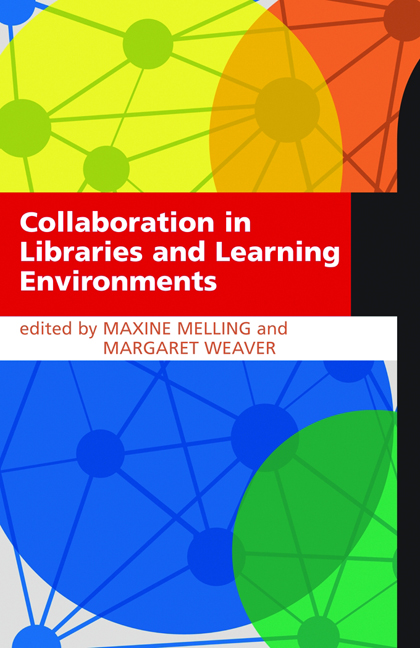Book contents
- Frontmatter
- Contents
- Contributors
- Introduction
- Abbreviations
- 1 The changing higher education context
- 2 Connecting with the student perspective
- 3 Working with professional associations
- 4 Culture, values and change: observations from three consortia in Canada
- 5 Managing complex change collaboratively
- 6 Leadership skills for collaboration: future needs and challenges
- 7 Knowing me … knowing you: the role of technology in enabling collaboration
- 8 Space: changing the boundaries
- 9 Collaborative service provision through super-convergence
- 10 Joint-use libraries and transformational change
- Index
8 - Space: changing the boundaries
Published online by Cambridge University Press: 08 June 2018
- Frontmatter
- Contents
- Contributors
- Introduction
- Abbreviations
- 1 The changing higher education context
- 2 Connecting with the student perspective
- 3 Working with professional associations
- 4 Culture, values and change: observations from three consortia in Canada
- 5 Managing complex change collaboratively
- 6 Leadership skills for collaboration: future needs and challenges
- 7 Knowing me … knowing you: the role of technology in enabling collaboration
- 8 Space: changing the boundaries
- 9 Collaborative service provision through super-convergence
- 10 Joint-use libraries and transformational change
- Index
Summary
Introduction
This chapter considers developments in collaborative approaches to the enhancement of academic library space.
Brophy defined the purpose of the academic library as follows:
Academic libraries are here to enable and enhance learning in all its forms – whether it be the learning of a first year undergraduate coming to terms with what is meant by higher education or the learning of a Nobel Prize winning scientist seeking to push forwards the frontiers of her discipline.
(Brophy, 2005, 216)First, these developments are viewed in the context of changes in higher education, learning and teaching and technology. The second section considers examples of collaborative approaches and the final section of the chapter attempts to evaluate these developments in terms of learning enhancement, rather than of space efficiency. While it is crucial to integrate physical and virtual learning spaces, this chapter will focus on physical library spaces.
Context
Developments in learning space design methodologies are driven by and impacted upon by changes in the higher education sector, by approaches to learning and teaching and by developments in technology, and these are considered briefly here.
Higher education, learning and teaching
A key element of institutional policies in the UK and elsewhere has been the emphasis on active learning and the development of students as independent lifelong learners. More recently this has been supplemented by issues such as personalization and ownership of learning as outlined in Higher Education in a Web 2.0 World (Committee of Inquiry into the Changing Learner Experience, CLEX, 2009).
In the UK ‘enhancing the student experience’ is a key focus of funding councils, the Quality Assurance Agency and the Higher Education Academy, as mentioned in Chapter 5. The Ramsden report (2008) highlighted the importance of students as partners in developing their own learning experience, which is a ‘joint responsibility’ between them and their institution. In many universities students are now involved in formal and informal decision-making and planning.
Changes in the higher education sector, including the expansion of a fees culture (Department for Business, Innovation and Skills, 2011) and the National Student Survey and other surveys, have resulted in differentiation in the marketplace. Universities will have to be clear about their complete offer to students as they try to attract fee-paying students as customers and to manage the different perception held by students of themselves as learners and as consumers/customers.
- Type
- Chapter
- Information
- Collaboration in Libraries and Learning Environments , pp. 129 - 148Publisher: FacetPrint publication year: 2012



